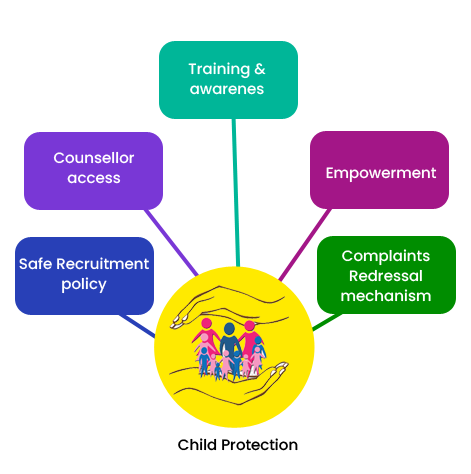DPIS SOCIETY comprehensive approach to Child Protection and Safeguarding is both robust and well-structured, demonstrating a deep commitment to creating a safe and supportive environment for all learners. Here’s a summary of the key aspects you’ve highlighted:
-
- 1. Compliance with Child Protection Laws: Emphasizing that your school complies with all relevant child protection laws and regulations applicable in the state reassures parents and stakeholders that your institution adheres to the highest legal standards in safeguarding.
- 2. Zero Tolerance Policies: The implementation of policies ensuring zero tolerance for bullying, corporal punishment, and any other forms of abuse reflects your strong stance on protecting the dignity and well-being of every student. This sends a clear message that harmful behaviours will not be tolerated.
- 3. Dedicated Committees: Having dedicated committees for Health Safety & Child Protection, Anti-bullying, and Internal Compliance shows a structured and organized approach to managing these critical areas. It ensures that there is focused attention and expertise available to address issues promptly and effectively.
- 4. Defined Roles and Responsibilities: Clearly defining roles and responsibilities for everyone working at the institution in relation to child safeguarding is crucial for accountability. It ensures that every staff member understands their obligations and takes proactive steps to protect students.
- 5. Training and Sensitization Programs: Providing regular training and sensitization programs on child protection principles for all staff and service providers ensures that everyone is aware of best practices and is equipped to handle situations appropriately.
- 6. Thorough Background Checks: The practice of conducting background and police verification for all staff and service providers underscores your commitment to ensuring that only trustworthy individuals are involved in the students' lives.
- 7. Child Support and Counselling: Offering child support and engagement through a school counsellor for any safeguarding concerns provides students with a safe space to express their worries and seek help. This is essential for fostering a supportive environment where students feel heard and protected.
- 8. Personal Safety and Life Skills Programs: Conducting programs on Personal Safety, Life Skills, and Sexuality for students through external agencies is an excellent way to educate and empower students, helping them to navigate complex issues confidently and safely.
- 9. Periodic Safeguarding Reviews: Conducting regular reviews to measure and improve safeguarding practices ensures that your child protection culture remains strong and responsive to emerging challenges. This continuous improvement approach is key to maintaining high standards over time.
DPIS SOCIETY institution’s commitment to safeguarding is evident in the thoroughness of your policies and the proactive measures you’ve implemented. This comprehensive strategy not only protects students but also builds a culture of safety, trust, and respect throughout the school community.

